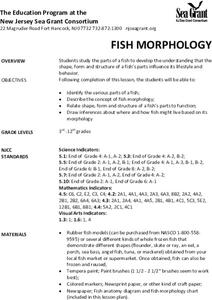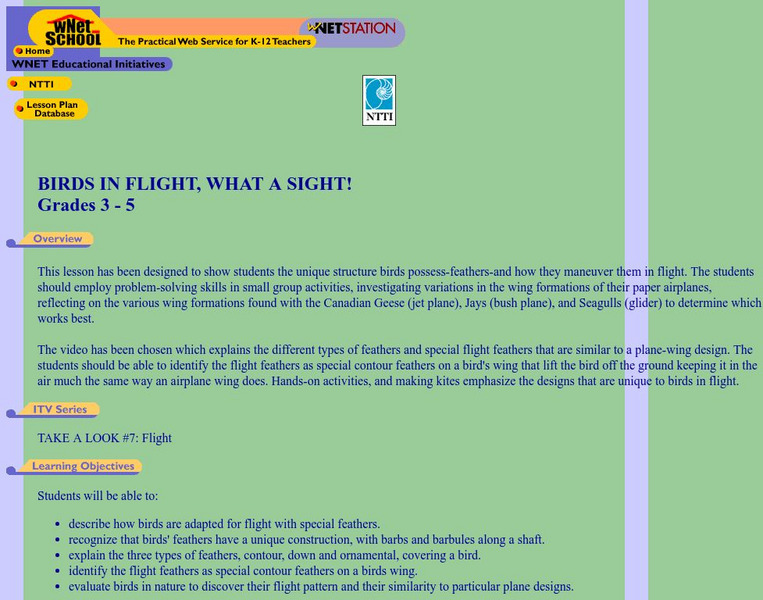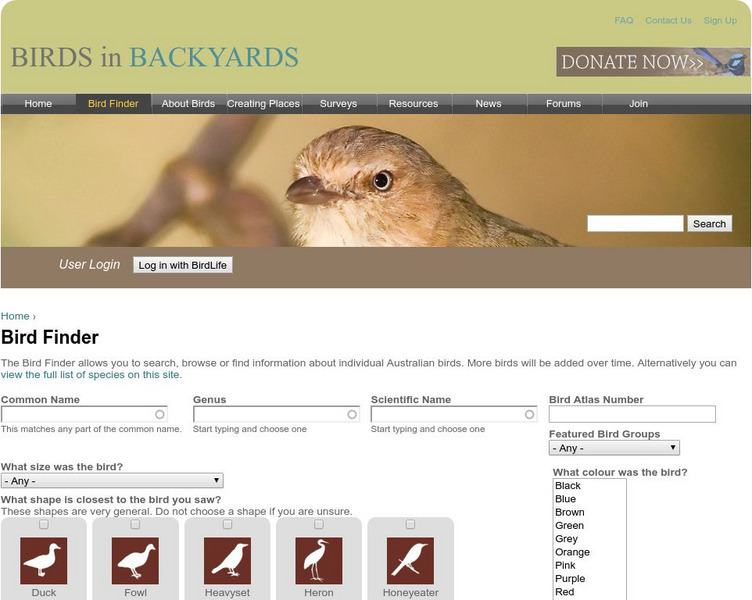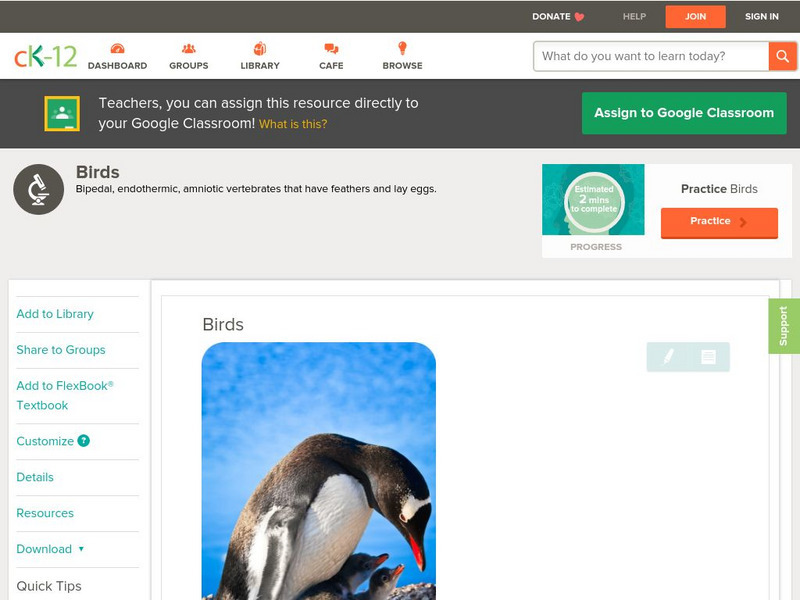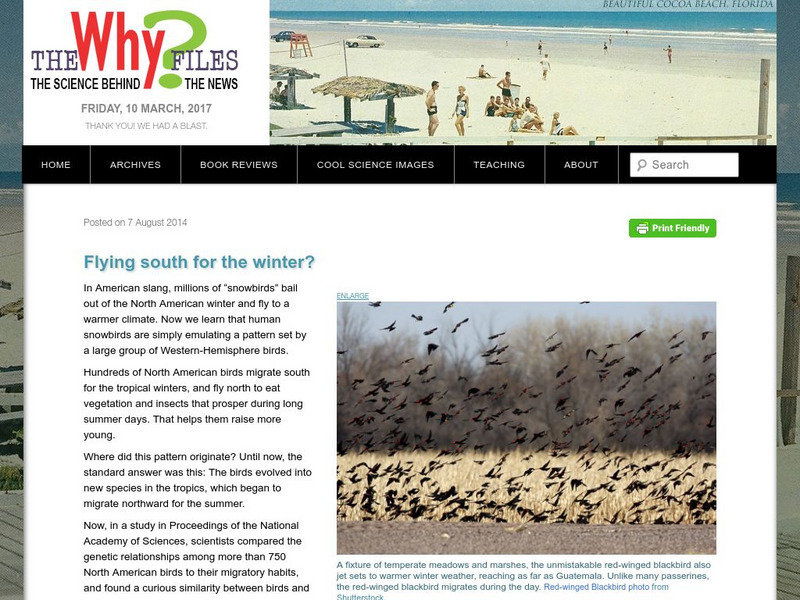Curated OER
Fish Morphology
Students identify the various parts of a fish. They describe the concept of fish morphology and relate shape, form and structure of a fish's parts to function.
Curated OER
Food Web
Students are able to define food web, and identify the interdependence of organisms within a system. They are able to describe how natural events and human activities can impact a food web.
Curated OER
Soaring With Air Power
Fourth graders view a Newton's Apple show that explores glider mechanics, explore the four forces, build and fly a glider to specific guidelines. They adjust the glider for greater accuracy and distance using four forces, and assess...
Curated OER
Charlie, the Caterpillar - An Integration of Lit. and Music (Elementary, Literature)
Students sing, dance and play instruments that are integrated with the book, "Charlie the Caterpillar."
Curated OER
Poetry To My Ears
Students investigate the 50 States Quarters Program. They use the state of Idaho as a basis for creating context for the lesson. The image on the coin becomes the subject. They differentiate between the reverse and obverse side of the...
Curated OER
Bat's a Fact
Second graders investigate the truths and misconceptions associated with bats. By illustrating the characteristics and uniqueness of these often feared and misunderstood creatures, 2nd graders increase their awareness of these nocturnal...
Curated OER
A Sense of Location: The Mental Map
Students consider the ways a mental maps of geographic landmarks can help migrating animals stay on the correct course.
Curated OER
A poem about India
Students read and discuss the poem Khwab before writing poems of their own. Students get the opportunity to explore impressionistic poetry about place.
Curated OER
How Do Airplanes Stay off the Ground?
Students use balloons and string to duplicate Bernoulli's Principle of wing shape and its affect on liftoff.
Curated OER
Land Use
Students examine ecosystems that covered Illinois 200 years ago, investigate some living and non-living components of ecosystems, identify components of prairie system, create food webs, and observe human effects on environment. Lessons...
Curated OER
Hawaii's Migratory Animals
Students act as travel agents to plan a trip for a migratory animal. They conduct research and design a travel brochure that includes a migratory route, illustrations of planned stopovers and special tourist attractions the animal might...
PBS
Pbs Learning Media: Bird in Flight
Students are asked to explain the characteristics of the bird in flight and how adaptations would allow the bird to fly a particular way. [0:32]
Science Buddies
Science Buddies: Why Do Birds Fly in a v Formation?
In this science fair project, the student will make a wind tunnel to test how the formation of birds in flight affects flight efficiency. Make the bird models out of Legos and have fun with this project. The Science Buddies project ideas...
PBS
Wnet: Thirteen: Birds in Flight, What a Sight!
This lesson has been designed to show students the unique structure that birds possess--feathers--and how they maneuver them in flight.
Canadian Museum of Nature
Canadian Museum of Nature: How Do Birds Fly?
Have you ever wondered about how birds are able to fly? View three 3D animations to see a bird take off, flap in flight and glide. This is an excellent resource to develop an understanding of the physical forces that make this one of the...
Other
Australian Museum: Birds in Backyards: Bird Finder
Need to identify a bird you saw flying through the sky while you were in Australia? This is the place to go. Choose a the size, color, then a shape and finally add any distinguishing marks. Then read about the bird you saw.
CK-12 Foundation
Ck 12: Life Science: Birds
[Free Registration/Login may be required to access all resource tools.] There is an amazingly wide variety of birds. Birds are vertebrates. Almost all have forelimbs modified as wings, but not all birds can fly. Learn more about birds in...
University of Wisconsin
The Why Files: On the Wing: Birds, Skeeters, Jet Planes
Evolution through natural selection governs the "design" of flying creatures. Engineers design flying machines. But flying is about physics, and physics is the ultimate arbiter of both processes, and that produces parallels in mechanical...
Crayola
Crayola: Flying Bird Fact Finds (Lesson Plan)
In this lesson plan, younger young scholars wrap up a bird unit by making a bird mobile and then write facts on their display.
Open Door Team
Open Door Web Site: Movement in the Air
A site on how birds fly discusses their anatomy that allows them to fly. Also discusses the role that feathers play in flight. Also includes a section which discusses other insects that fly.
CK-12 Foundation
Ck 12: Biology: Bird Structure and Function
[Free Registration/Login may be required to access all resource tools.] An overview of flight structures in birds.
Other
Ornithology: Bird Flight
Excellent coverage of the adaptations and actions of birds in regard to flight. Contains specific information, diagrams, and pictures.
University of California
Ucmp: The Evolution of Flight in Birds
Evidence from the fossil record is used to support bird evolution from small carnivorous dinosaurs. In the student module, feathers, behavior, and skeletal structure are examined in an interactive lesson designed to impart a complete...
University of Wisconsin
The Why Files: Flying South for the Winter?
A look at long-distance migration reveals a surprising pattern. Migration did not originate in the tropics, home to bird diversity.


